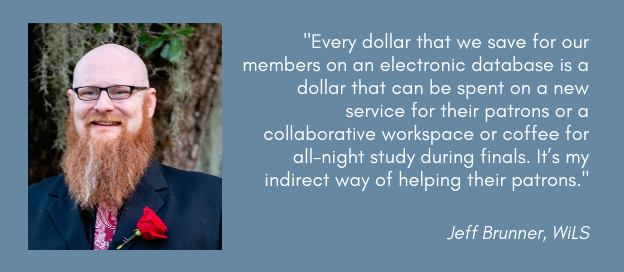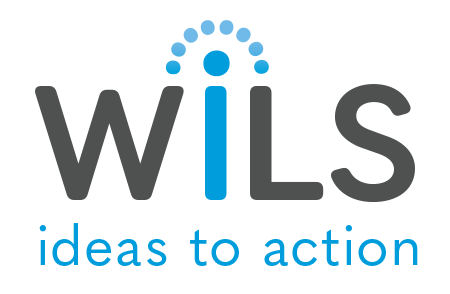
You may have noticed that WiLS has some new faces among its staff. We are excited to grow our skills and improve our services by bringing new members into our team while also leveraging the experience and strengths that our existing team contributes. In the coming months, we will be sharing a little more about WiLS staff members, both new and experienced, in their own words.
This month, we talk with Jeff Brunner, Community Liaison and Service Specialist, who began working with WiLS in 2013.
Tell us about your background.
One of my earliest memories is hanging around the Kenosha Public Library in the mid-80s. My mom was a clerk there, and sometimes when my regular babysitter wasn’t available, she’d bring me to work. I’d hang around, reading books and playing on the Apple computers. Back then you could reserve time on one of their two desktop computers and check out games to play. Looking back, that time spent reading and playing games was hugely formative for me for several reasons.
In school, I liked History the best. So, when I went to college, I knew I was going to be a History major and I thought I’d teach high school. Not that long into my Freshman year at UW-Green Bay, I knew I didn’t want to teach school but thought I might end up a historian or history professor. So, with an eye towards a Ph.D. program, I knew I’d need to do something to broaden my horizons beyond the classroom work. I talked to my department advisor who suggested an internship. He put me in touch with Deb Anderson who ran the University Archives and I was lucky enough to get an internship there. The archives were part of the library and eventually, the internship turned into a student job. I worked in several departments and by the time I graduated from UWGB, I knew that my future was in libraries.
After graduation, I worked for several years in the private sector before I was able to come back to UWGB as a staff member. I managed the Interlibrary Loan department there for five years. Meanwhile, I got into and completed library school online via UW-Milwaukee. When I finished library school, I went to work at UW-Oshkosh as their Electronic Resources Librarian. I was there for two years before I saw the posting for this job at WiLS. I’ve been with WiLS since July of 2013.
In my personal life, I’m lucky enough to have a 10-year-old and an amazing wife. I’m a lifelong geek, into sci-fi, fantasy and most of all, games. I play all sorts of card games, board games, and role-playing games. Every August, I go to Indianapolis for the Gen Con games convention, which is something I look forward to all year.
What do you do for WiLS?
I’m a Community Liaison / Service Specialist working on our cooperative purchasing service for our academic library members. I love working with our members to help them to afford the resources that their students, faculty, and staff need to do their work. But that’s really just the task that I do, it’s not my job. When I worked at UWGB in the ILL department, I realized that our staff could find, pull, and scan articles a lot faster than students or professors. My thinking was that I wanted our students and professors doing research and generating new ideas rather than standing at a copier. So we launched a document delivery service on the theory that any time we spent making those copies was time that students, faculty, and staff could spend doing scholarship.
I think of the cooperative purchasing service in similar terms. Every dollar that we save for our members on an electronic database is a dollar that can be spent on a new service for their patrons or a collaborative workspace or coffee for all-night study during finals. It’s my indirect way of helping their patrons.
Why did you make the decision to do this job?
At the time when WiLS announced that it was hiring, I was already looking for a way to either work in Milwaukee or somehow make my job online, so I could move there. The thing that caught my eye about the job was that it was remote and I could live anywhere in Wisconsin. So, that’s why I looked at it initially. But when I really started to get what Stef and the Board were trying to do with this re-launch, I knew I wanted to be a part of it. Here was an organization that worked with all kinds of libraries, had a strong sense of those libraries’ importance to the world, and was led by someone that I already really respected. Why wouldn’t I want to work there? I had a great job, and a long history with the UW System, so it was a little scary to leave, but I’ve never regretted coming to WiLS.
If money or capacity were no concern, what WiLS service would you implement or expand?
Something that we talk about a lot (and have been talking about for years) is our role in facilitating collaborative work between libraries. Our birds-eye view of Wisconsin’s library community lets us see that there are all kinds of great libraries doing all kinds of great work. At the same time, there are all kinds of libraries facing the same challenges. I’d love to see our 2019 strategic initiative around developing an infrastructure for connecting, storing, and sharing among members really take off. I’d pour as many of our resources as possible into supporting collaboration, because collaboration is the best thing about this community.
What are you listening to or watching or reading right now that’s making you think?
One of the books I got from family for Christmas (you librarians know what I’m talking about) is How Long ‘Til Black Future Month? by N.K. Jemisin. As I mentioned earlier, I’m a long-time sci-fi and fantasy fan. But, since my whole life I’ve been white, male, and straight, it’s easy for me to be one. Almost all sci-fi and fantasy was (and largely still is) written for white, male, straight readers. Jemisin’s books are really opening my eyes to a world of genre fiction not geared toward that specific demographic and I’m loving it. It also helps that she’s a fantastic writer.
What do you see as a significant opportunity for our members in the next ten years?
These are challenging times. There is a disturbing level of anti-intellectualism and a devaluation of not only higher education, but even critical thinking. I’m afraid that the combination of flagging support (both in opinion and dollars) for higher education and the rampant monetization of scholarly output are major problems. But I’m really encouraged by the momentum that the Open Access and Open Educational Resources movements are gaining. We often hear public libraries called “the people’s university” so they’ve always been agents for the spread of knowledge. I think libraries have a huge opportunity to support OA and OER to push back against the exploding costs of higher education and scholarly communication.
Jeff is awesome. Want to connect with him about a potential project or idea that’s floating around? You can! Send him an email at brunnerj@wils.org.
